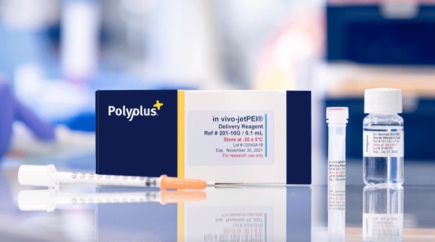in vivo-jetPEI® is a ready-to-use cationic polymer reagent recommended for in vivo transfection of DNA, siRNA, miRNA, shRNA and other oligonucleotide...

We use cookies to help you navigate efficiently and perform certain functions. You will find detailed information about all cookies under each consent category below.
The cookies that are categorized as "Necessary" are stored on your browser as they are essential for enabling the basic functionalities of the site. ...
Necessary cookies are required to enable the basic features of this site, such as providing secure log-in or adjusting your consent preferences. These cookies do not store any personally identifiable data.
Functional cookies help perform certain functionalities like sharing the content of the website on social media platforms, collecting feedback, and other third-party features.
Analytical cookies are used to understand how visitors interact with the website. These cookies help provide information on metrics such as the number of visitors, bounce rate, traffic source, etc.
Advertisement cookies are used to provide visitors with customized advertisements based on the pages you visited previously and to analyze the effectiveness of the ad campaigns.
Cancer remains a leading cause of morbidity and mortality worldwide. To date, the most common types of cancer treatment are surgery, chemotherapy and radiation therapy. However, these treatments are invasive and lead to very deleterious secondary effects. Hence, there is a real need for the development of more targeted therapies. Among the recent developments of novel biotherapies, the nucleic acid-based therapy is emerging and represents novel promising approaches of treatments.
Tumor cell growth and subsequent invasion leading to metastasis formation are caused by aberrant gene expression due to genetic and epigenetic mutations. Therefore more and more anti-cancer therapies aiming to restore a normal expression for these genes are developed. This can be performed by introducing into cancer cells either a plasmid DNA to re-establish a normal gene expression and function or a siRNA to silence the aberrant gene expression.
Other therapies consist in expressing a suicide or a toxin gene in tumors preferably under the control of a cancer cell specific promoter. Expression of this suicide or toxin gene specifically induces apoptosis of tumor cells.
Immunotherapy is a treatment that stimulates the immune system specifically against tumors. This can be achieved either by stimulating an immune response against a specific tumor-associated antigen, or through activation by synthetic double stranded RNAs (dsRNA) such as polyinosine-polycytidylic acid (poly I:C) or by 5’ppp-RNA recognized by receptors of immune cells such as dendritic cells and natural killer (NK) cells.
The most common carriers used to introduce nucleic acids into cancer cells are viruses, but with the limitation of safety issues. The polymer-based delivery reagent in vivo-jetPEI® from Polyplus-transfection® and its derivatives in vivo-jetPEI®-Gal and in vivo-jetPEI®-Man offer a safer and easier alternative to viruses to deliver plasmid DNAs or siRNAs to tumors. Indeed, in vivo-jetPEI®-based nucleic acid delivery is now widely used for tumor growth inhibition or regression studies, with some of these studies already in preclinical and clinical phases (Ohana et al., 2004; Sidi et al., 2008; Matouk et al., 2013; Buscail et al., 2015). Preclinical grade reagents as well as a GMP grade version of in vivo-jetPEI® is available for experiments in humans with the goal of developing a commercialized treatment against cancer.